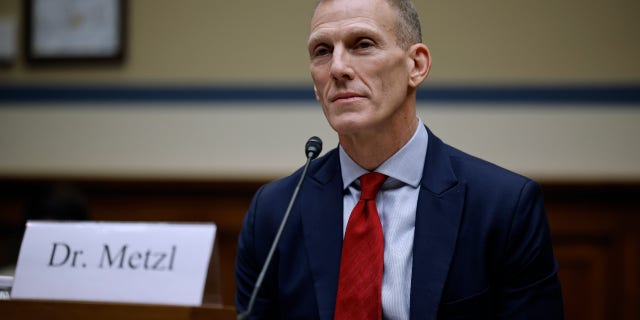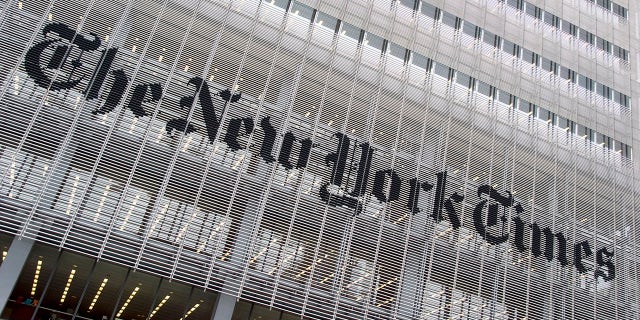[ad_1]
The New York Times appears to be whitewashing its own dismissal of the COVID lab leak theory by suggesting it was only vocal critics of the former president who marginalized the now-growing hypothesis.
In a report recapping Wednesday’s House Select Subcommittee on the Coronavirus Pandemic, the Times wrote how the possibility that COVID-19 accidentally leaked from the Wuhan Institute of Virology was “initially dismissed as a conspiracy theory by critics of President Donald J. Trump, who embraced the idea while trying to blame China for the pandemic. But it is now getting a second look.”
Except the Times itself declared the lab leak a “conspiracy theory” early on in the pandemic.
Amid the media pile-on of Sen. Tom Cotton, R-Ark., who in February 2020 suggested the origin of the pandemic could have been a lab leak, the Times ran the headline “Senator Tom Cotton Repeats Fringe Theory of Coronavirus Origins,” calling his remarks an “unsubstantiated possibility.”
CREDIBILITY CRISIS: NEW YORK TIMES HELPED MISLEAD AMERICA OVER COVID LAB LEAK THEORY
“Senator Tom Cotton, Republican of Arkansas, has repeated an unsubstantiated conspiracy theory that has spread from small-town China to the right-wing news media in the United States: The new coronavirus originated in a high-security biochemical lab in Wuhan, the Chinese city at the outbreak’s center,” Alexandra Stevenson, currently the paper’s Shanghai bureau chief, reported at the time. “The conspiracy theory lacks evidence and has been dismissed by scientists. But it has gained an audience with the help of well-connected critics of the Chinese government such as Stephen K. Bannon, President Trump’s former chief strategist.”
The New York Times previously declared the theory that COVID leaked from the Wuhan Institute of Virology as a “conspiracy theory.” ((Photo by Hector RETAMAL / AFP) (Photo by HECTOR RETAMAL/AFP via Getty Images))
The Times later wrote, “Right-wing media outlets fan the anger. Beijing, with its heavy-handed censorship and stranglehold on information, unwittingly gives the conspiracy theories a boost… The Chinese authorities say the outbreak began in a market in Wuhan where wild animals were sold. The city is also home to a biochemical laboratory. Although much remains unknown about the coronavirus, experts generally dismiss the idea that it was created by human hands.”
Even in Wednesday’s report, the Times was eager to downplay the momentum the lab-leak theory has gotten as expressed at the House subcommittee hearing.
The paper ran the headline “Republicans Push Lab Leak Theory on Covid’s Origins, but Lack ‘Smoking Gun,'” suggesting the person pointing out the absence of a smoking gun was someone opposed to the lab leak theory itself.
TRUMP MADE ME DO IT: LIBERAL MEDIA BLAMES ITS DISMISSAL OF LAB LEAK THEORY ON EX-PRESIDENT’S ‘XENOPHOBIA’
But that quote came from Dr. Jamie Metzl, a former Clinton administration official and an adviser to the World Health Organization (WHO) who actually favors the lab leak theory over the natural origins theory.
“There is no smoking gun proving a laboratory origin hypothesis, but the growing body of circumstantial evidence suggests a gun that is at very least warm to the touch,” Metzl, a Democrat, told lawmakers.
Despite using part of the quote in its headline, the Times buried Metzl’s support for the lab leak theory in its 10th paragraph.

A quote from Atlantic Council Senior Fellow Dr. Jamie Metzl from Wednesday’s congressional hearing was twisted by The New York Times to suggest he’s an opponent of the lab leak theory. (Chip Somodevilla/Getty Images)
Back in 2020, the Times’ coverage of the pandemic was flooded with lab leak denialism.
In one report, the Times suggested former President Trump wanted to manufacture a connection between the pandemic and the Wuhan lab by leaning on the intel community to find evidence.
“Administration officials have pushed American spy agencies to hunt for evidence to support an unsubstantiated theory that a government laboratory in Wuhan, China, was the origin of the coronavirus outbreak,” the Times reported in April of that year. “Analysts are concerned that the pressure from administration officials will distort assessments about the virus and that they could be used as a political weapon in an intensifying battle with China.”
CREDIBILITY CRISIS: CNN BOSS ORDERED STAFF NOT TO CHASE DOWN COVID LAB LEAK THEORY AS PANDEMIC UNFOLDED
In June 2020, the Times science writer James Gorman told readers the Wuhan Institute of Virology had “been the target of conspiracy theorists who promote the idea that the novel coronavirus was made in a lab. Scientists and U.S. intelligence agencies agree that the overwhelming likelihood is that the virus evolved in nature.”
Times science and health reporter Apoorva Mandavilli was forced to apologize in May 2021 for dismissing the “lab leak” theory as implausible and having “racist roots,” even as it was already starting to gain significant credence in the media at that point.

In the early months of the pandemic, The New York Times’s coverage was flooded with lab leak denialism. (iStock)
CLICK HERE TO GET THE FOX NEWS APP
Earlier this month, there was a bombshell report that the U.S. Energy Department believes the virus likely originated from a leak at the Wuhan lab, though media skeptics put emphasis on the department’s “low confidence” grade on the theory.
However, FBI Director Christopher Wray offered a much stronger endorsement of the lab leak theory, telling Fox News’ Bret Baier that COVID “most likely” came from the Wuhan Institute of Virology.
Fox News’ Brian Flood contributed to this report.
[ad_2]
Source link
